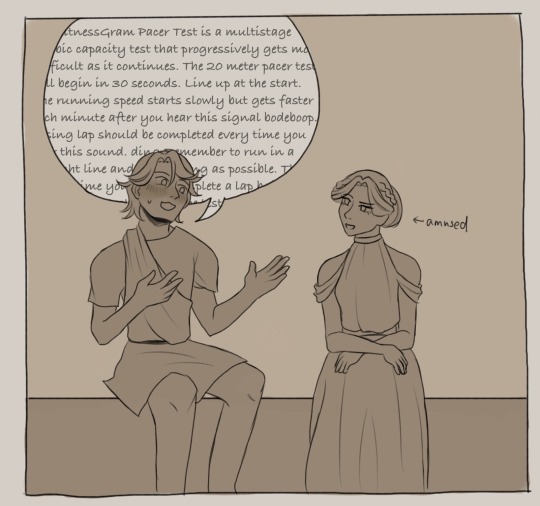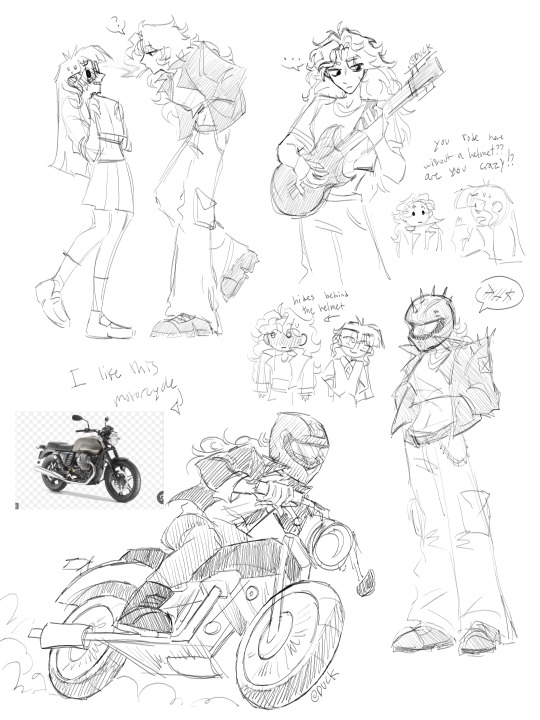#advice asks
Explore tagged Tumblr posts
Note
hey! can I ask you what type of therapy you get? been going to therapy for a while and struggling to actually participate properly due to emotional amnesia: to the point where when I’m asked how my week was I can remember nothing and that basically sets the mood for the whole session, like we find things to talk about but it either ends up feeling like I’m talking about someone else or just ends up being purely intellectual, coping strategies and potential diagnoses etc. I know there’s therapy specifically for CDD but I have no idea how to find it! Or how I’d go about accessing it since my masking and dissociation makes it really difficult to ever communicate my symptoms—because I can never remember them or even if I write it down, I’m completely unable to elaborate on the experience!
Hey! I’d be happy to talk about my therapy sessions!
Firstly, when finding a therapist, I looked specifically for people who:
Worked with autistic people
Worked with LGBT+ people
Focused on trauma and dissociation
My therapist, who has helped me just… so, so much, focuses on Dialectical Behavior Therapy, Emotionally Focused Therapy, and EMDR. While his top speciality is PTSD, he has a lot of experience with dissociative disorders.
When we started therapy, we experienced a lot of emotional amnesia as well. For the first year or so, we talked about my emotions and tried to work on grounding strategies. We honestly talked very little about the DID plural aspect, because it wasn’t important; what was important was getting into a window of tolerance for daily life.
An average session with my therapist looks like this:
He starts by asking who’s fronting, which is something we let him know we like from the get go.
Then he asks, “If you were a phone battery, what percentage would you be at today?” This serves a lot of purposes. It’s a way for me to check in and ground myself, to figure out what my levels are at the moment. It’s also a way for me to launch into the conversation; if I’m low energy, we’ll focus on emotional regulation and self soothing, making a plan for recovery from the energy drain, and a little discussion on what the draining experience was. If I’m high energy, he’ll usually present options for what we can do, which is mostly “We can discuss work, family, or DID!”
On those low battery days, it helps a lot to identify my emotions when I can identify, “shit, I’m at 20%, the fuck happened that made me feel this way?” It causes me to really sit down and think about the day. I don’t always get the full memory, but it gives me something to discuss, and through discussing the emotions of those situations, I usually remember more by the end.
Most frequent discussions are about how I feel in a current moment, and associating those feelings with colors, bodily reactions, and generally my selfhood. I’ve had to do a lot of work on recognizing my emotions as mine, instead of someone else’s. We also do a lot of work with conflicting emotions and the thoughts I have being true at the same time; I have a lot of conflict in my own thinking, where it feels more than one thing is true at the same time, and he’s often the one to remind me that more than one thing can be true.
My therapist writes a lot down and reminds me what other parts said in therapy. He keeps a bit of a timeline for me, which helps a lot.
I will say, I wouldn’t launch directly into EMDR therapy. It by far helped us the most, but it takes prep time. You’ve gotta be ready to confront some really emotional, difficult memories head on, which also means bracing yourself for difficult memories after session.
My suggestion is to look for a therapist on psychology today who specializes in treatment of DID and mentions emotional therapy in particular, as that appears to be what you struggle with. During an intake session, I would mention that you’re particularly worried about emotional amnesia, and that you struggle a lot with your memory.
Last suggestion: if you struggle that much with emotional amnesia, I highly recommend keeping a therapy journal to look back on one day. We keep a running log of sessions in our personal discord server (though we haven’t updated in months since we don’t feel the need to now after three years of therapy). In the early days, it helped a lot to be able to scroll back and go, “damn, Wade was out?? Fuck, he talked about THAT memory? Oh Jesus I forgot that memory existed.”
I wish you the best of luck on finding good therapeutical practices! Just know, one size does not fit all, and this is just what helped me!
#did#dissociative identity disorder#osdd#other specified dissociative disorder#osddid#did positivity#cdd#complex dissociative disorder#advice#advice asks#did advice#therapy
25 notes
·
View notes
Note
We are looking into becoming a peer support worker. We live rural, and rnt super familiar with what the process entails. I would be curious to know what it was like for someone with a CDD to work towards that. Would you be able to talk about what it was like for you?
( or if you have spoken about that process before, could you direct us there?)
Many thanks:)
Hey! I didn’t realize I’d talked about that here. I’d start with going to your state Department of Mental Health’s website. From there, it depends on the state. For my state, you go to the page for forms/applications, and there are forms for CPSS (Certified Peer Support Specialist) and CPRSS (Certified Peer Recovery Support Specialist) certification programs. You may or may not have to print them out. I had to print and mail mine.
Once you’ve got that squared away, search for CPSS/CPRSS (depending on whether you’re working with general mental illness or substance abuse — often either certification will do!) jobs within the area in general — colleges often have openings, as do many in- and out-patient psychiatric facilities. If you attend 12-step meetings like AA/NA/Al-Anon or have any other in-person support groups, ask around to see if anyone there knows of job openings anywhere in the area.
It’s important to know that when searching for jobs in peer support, word of mouth is going to get you much further than an internet search. Call around, call the Department of Mental Health for your state, call psych facilities. Joining some support groups is a great place to start.
They don’t really care what mental illness you’ve got when you apply for certification, and with jobs it’s usually just a general wheelhouse.
CDDs mean you can work well with trauma and dissociation.
To work in peer support, you’re going to need to be in a place where you are focusing on your recovery and healing and using that as your frame of reference, rather than only shared pain. The reason that peer support works isn’t commiseration — it’s working towards a common goal. Commiserating can certainly be a part of that, but learn to uplift yourself and learn from those around you. Remember that if you treat yourself badly, you’re liable to end up doing the same to others.
Thank you for the ask, and let me know if you have any more questions or need further clarification.
3 notes
·
View notes
Text
Writing Tips Master Post
Edit: Some posts may be deleted
Character writing/development:
Character Arcs
Making Character Profiles
Character Development
Comic Relief Arc
Internal Conflict
Character Voices
Creating Distinct Characters
Creating Likeable Characters
Writing Strong Female Characters
Writing POC Characters
Building Tension
Writing Grumpy x Sunshine Tropes
Writing Sexuality & Gender
Writing Manipulative Characters
Writing Mature Young Characters
Plot devices/development:
Intrigue in Storytelling
Enemies to Lovers
Alternatives to Killing Characters
Worldbuilding
Misdirection
Things to Consider Before Killing Characters
Foreshadowing
Story Structure
Narrative (+ how to write):
Emphasising the Stakes
Avoid Info-Dumping
Writing Without Dialogue
1st vs. 2nd vs. 3rd Perspective
Fight Scenes (+ More)
Transitions
Pacing
Writing Prologues
Dialogue Tips
Writing War
Writing Cheating
Writing Miscommunication
Writing Unrequited Love
Writing a Slow Burn Btwn Introverts
Writing Smut
Writing Admiration Without Attraction
Writing Dual POVs
Writing Unreliable Narrators
Worldbuilding:
Worldbuilding: Questions to Consider
Creating Laws/Rules in Fantasy Worlds
Book writing:
Connected vs. Stand-Alone Series
A & B Stories
Writer resources:
Writing YouTube Channels, Podcasts, & Blogs
Online Writing Resources
Outlining/Writing/Editing Software
Translation Software for Writing
Writer help:
Losing Passion/Burnout
Overcoming Writer's Block
Fantasy terms:
How To Name Fantasy Races (Step-by-Step)
Naming Elemental Races
Naming Fire-Related Races
How To Name Fantasy Places
Ask games:
Character Ask Game #1
Character Ask Game #2
Character Ask Game #3
Miscellaneous:
Writing Tips
Writing Fantasy
Miscommunication Prompts
Variety in Sentence Structure (avoiding repetition)
#masterlist#masterpost#writeblr#writing#writing tips#writing advice#writing help#writing resources#author resources#writer resources#creative writing#character writing#character development#plot development#narrative#book writing#writers block#writer stuff#writer things#fantasy writing#writer ask game#deception-united
31K notes
·
View notes
Text
How can I become a writer?
Write.
But I don't know where to start.
Write.
But I'm worried.
WRITE.
What if nobody likes it?
W R I T E
What if it's not very good?
Write. Write. WRITE. WRITE.
W
R
I
T
E
Write
Write. Write. Write. Write. Write. Write.
Write.
Write
Write
Write
Write
Write
Write
Write
Write
W R I T E
Write write write
Write
Write
#writer things#writer stuff#writing community#creative writing#writeblr#playwright#playwriting#screenplay#short story#writing#writers on tumblr#writers and poets#writing tools#writerscommunity#writing advice#writing asks
9K notes
·
View notes
Note
Hi! I'm looking for some advice and I'm not really sure who to go to atm. Just let me know if this is too much and feel free to ignore if it is lol
I'm in a very new relationship, like, less than 2 weeks old. And I don't know when a good time to bring up kinkiness is. I know sex isn't everything, but it's still an aspect of a romantic relationship that's important to me. I want to feel comfortable with my partner and I don't want to ever make them uncomfortable. I just don't know when to talk about it. Should I have already talked about it? Do I wait until I think we're closer to having sex? I'm not sure..
Any advice would be really appreciated ❤️
hi sweetheart! you can always come here for advice!!!
for me personally I think that always comes nearer to when I'm having sex with someone or if we get to the sexting stage first. If we end up sexting before we have sex in person, I always find it's quite easy and less awkward to bring it up that way!
or on the contrary, I've also stopped mid sex and between very breathless kisses have had this conversation with someone too and that was HOT let me tell you 🫦
1 note
·
View note
Text



The sillies
When even Athena the Virgin goddess whose most intimate encounter was stabbing her bff thinks you’re cooked, you’re definitely cooked
#Odysseus (virgin) asking Athena (virgin goddess) for romantic advice is so funny to me#like it’s literally the blind leading the blind#I like to think even after days of strategizing with Athena ody still has 0 rizz#yes he’s trained in tactical seduction and yapping but up against someone he actually likes?#Penelope is just amused and charmed by his rizzlessness#0 rizz#epic the musical#epic odysseus#epic athena#epic penelope#odypen#fanart#xria art
10K notes
·
View notes
Text
write unpublishable things. it's good for you.
#writeblr#from ellie#writing advice#if you have a friend who likes to write ask them to rp with u#write poems so specific no one knows what you mean#write a book longer than war and peace#write a 900k word thriller or a 40k romance or a 200k comedy#you need to do things no one is asking for#so you know it's for you to its core
19K notes
·
View notes
Text

evening drive

oh yes and some little doodles of them... sunset totally drives a motorcycle right?? been experimenting with how i want to draw her so maybe this'll stick idk.
#i use too much purple dont i#sciset#my art#mlp fim#mlp art#my little pony#mlp#twilight sparkle#eqg#mlp fanart#mlp eqg#equestria girls#scitwi#sci twi#mlp eg fanart#sunsetsparkle#sunset shimmer#ik the motorcycles dont match but i still havent figured out what i want hers to look like#aww lookit them they're both nerd weirdos#also thank you to the 12 different people i asked for advice when i was drawing this#3 point perspective is a pain in the.. back
6K notes
·
View notes
Text
red robin says:

#tim drake#red robin#dc comics#dc fanart#my art#no one asked for this but me#motivational advice 💛#tim said this to dick who then held onto jason with a death grip to give him unsolicited advice
3K notes
·
View notes
Note
The thing nobody tells you is that you can just write down that one scene you've been replaying in your head with no connections to anything. You don't have to wait until the plot get there or until you come up with the rest of the story around it that makes that scene makes sense. You can just write that one scene.
you are so right
#im kissing you straight on the mouth anon#writing#writers#writer#fanfiction#fanfic#writers woes#writers meme#writer memes#ao3#wip#thanks for the ask :)#ask#writers advice
3K notes
·
View notes
Text




More Portal AU angst and moral dilemmas~
The concept was slowly eating through my brain for quite some time now:) Just think about it. Prowl loves Jazz but he also recognises that making Jazz into an immortal machine would involve killing Jazz and replacing him with authentic copy.
While the absence of morality core deprives Prowl of the concept of actually caring for people and replaces it with the “How the person makes me feel and what they do for me”. Usual Prowl wants to have Jazz with him while Evil Prowl wants to keep “experiencing” having Jazz with him.
#maccadam#transformers#humanformers#tf portal au#jazz#prowl#jazzprowl#you know how other artists say ‘’click for better quality’’#yea#if you click the quality will absolutely not get better#the resolution is shitty I had the whole thing drawn in just one layer of one canvas crammed together and tiny#👍#if anything. Tumblr ‘’eating quality’’ is a beauty filter#also. for the record and because I can already see someone asking about it#Robot Prowl is a copy of human Prowl in terms of personality BUT a bit more affectionate#because he was connected to the brain of dying human Prowl#and you know how number one regret of all dying people is not spending enough time with their loved ones#not telling them how much they mean#yep#robot Prowl experienced the feeling of deep deep regret of being disconnected from people#so robot Prowl is like COME HERE LEMME TAKE CARE OF YOU! What can I give you to show that I care about you? Food? Protection? Kiss?#while human Prowl was more like. Here’s my valuable advice but I will not act on it unless you ask me bc I’m busy lots of work lots of work#tf portal art
1K notes
·
View notes
Text

⋆。‧˚ʚ💋ɞ˚‧。⋆ 𝐲𝐨𝐮. 𝐦𝐞. 𝐧𝐨𝐰. (VERY USFT!!!!) 𝐚𝐜𝐭𝐢𝐨𝐧𝐬 - send ‘reverse’ for the sender and receiver to swap. adjust wording as needed!
[ grind ] sender straddles receiver’s lap and starts grinding against them, slow and intentional
[ whisper ] sender leans in and whispers exactly what they want to do to receiver in excruciating detail
[ wristgrab ] in the middle of a heated moment, sender pins receiver’s wrists above their head
[ needy ] sender pulls receiver into their lap, desperate and breathless, kissing them like it’s not enough
[ tease ] sender drags their lips and tongue down the length of receiver’s stomach, but stops just before going lower
[ undone ] sender undresses receiver one piece of clothing at a time, dragging it out with loaded glances
[ taste ] sender drops to their knees and starts kissing up the inside of receiver’s thighs
[ lapfull ] sender drags receiver onto their lap in the middle of a conversation, their hands already wandering
[ control ] sender takes full control, guiding receiver’s hands, body, and every motion
[ tug ] sender grips receiver’s hair and yanks their head back to kiss them roughly
[ choke ] sender wraps a hand lightly around receiver’s throat while their lips are barely apart
[ lipbite ] sender bites down on receiver’s bottom lip while grinding against them
[ praise ] in the middle of it all, sender whispers praise between every movement "just like that," "you're doing so good," "don’t stop"
[ beg ] sender makes receiver beg for it
[ mouthy ] sender licks into receiver’s mouth mid-kiss, messy and aggressive
[ suck ] sender sucks a mark into receiver’s neck, possessive and without shame
[ edge ] sender brings receiver right to the brink, over and over, refusing to let them finish
[ wrecked ] sender has one goal: to leave receiver trembling and ruined beneath them
[ needy grind ] clothes still on, sender grinds against receiver until they’re both panting, desperate for more
[ between ] sender slips a hand between receiver’s thighs while whispering, “you’ve been wanting this, haven’t you?”
[ ride ] sender pushes receiver down and climbs on top, holding eye contact the entire time
[ spit ] sender leans over and lets spit drip into receiver’s mouth before kissing them hard
[ mess ] clothes scattered, sheets ruined, bodies tangled—sender and receiver didn’t hold back
[ slow ] sender draws everything out. every stroke, every breath, every motion unbearably slow
[ possessive ] sender fucks receiver like they’re trying to make sure no one else ever will
[ overstim ] sender keeps going even after receiver's already shaking from release
[ grip ] sender grabs receiver by the hips, holding them in place while taking full control
[ hot & heavy ] sender and receiver go at it somewhere they absolutely shouldn’t
[ control freak ] sender lets receiver think they're in charge… until they flip the roles mid-way
[ lips everywhere ] sender kisses every part of receiver’s body.
[ breathless ] sender doesn’t let up until receiver is clawing at their back, gasping for air
[ all night ] sender makes sure receiver doesn’t sleep... again, and again, and again
[ tongue ] sender slides their tongue along receiver’s skin, taking their time tasting every inch
[ dark corner ] they don’t make it home! sender drags receiver into a shadowed corner and gets to work
[ eye contact ] sender holds eye contact the entire time they’re going down on receiver
[ mirror ] sender takes receiver in front of the mirror so they can both watch
𝐝𝐢𝐚𝐥𝐨𝐠𝐮𝐞
❝ i want to hear every sound you make. don’t hold back. ❞
❝ get on your knees—now. ❞
❝ you’re not leaving this bed until i say so. ❞
❝ look at you. all mine and dripping for it. ❞
❝ you said 'just one more time' last time, remember? ❞
❝ keep quiet, or they’ll hear. ❞
❝ is this what you wanted? me, like this, ruining you? ❞
❝ you’re shaking—already? we’ve barely started. ❞
❝ i haven’t even touched you yet, and you're already begging. ❞
❝ be good for me and spread your legs. ❞
❝ don’t you dare finish until i tell you to. ❞
❝ you’re going to be the death of me, but i’ll die happy. ❞
❝ say it. say you need me. say it louder. ❞
❝ i could do this all night. want to test me? ❞
❝ if you want more, use your words. ❞
❝ you look so pretty when you beg. ❞
❝ you’re not shy now, are you? ❞
❝ take it. like that. good. ❞
❝ tell me where you want my mouth. ❞
❝ don’t bite your lip—moan. i want to hear it. ❞
#did i make these for me? maybe#what is having a prompt blog if not making prompts u want to receive#usft#spicy#rp meme#rp memes#rp prompts#roleplay meme#smut memes#nonverbal prompts#rp ask meme#rp prompt#ask meme#sentence starters#inbox meme#indie rp#askbox meme#rp ask#rp ask box meme#rp sentence meme#sentence starter meme#rp sentence starters#inbox memes#rp inbox meme#inbox starters#rp#starters#rph#rp help#writing advice
2K notes
·
View notes
Text
thinking about how before mcr was formed gerard was like an urban legend to frank cause they never left the house so he only knew of gerard through what mikey said
#also the fact that g asked him for advice on forming mcr not long after 9/11#my chemical romance#mcr#frank iero#gerard way#mikey way#ray toro
1K notes
·
View notes
Note
advice for a character who grips control like a lifeline. who wants to be in charge of every little thing because whenever they're not in control of something something bad could happen. has happened. they can't let a single variable be wild or in someone else's hands
How to Write a Controlling Character
Backstory Rooted in Trauma or Guilt
This character likely has a history that has ingrained the belief that they must be in control or face devastating consequences. Perhaps they once trusted someone else with something crucial—a promise, a responsibility, or a life-altering choice—and that trust was broken in a way that had lasting repercussions. For example, maybe they lost someone because they weren’t “careful enough,” or they experienced a betrayal when they trusted another person’s plan.
They might frequently flash back to this moment, possibly catching themselves thinking, If only I’d been the one in control, this wouldn’t have happened. This memory fuels their need to keep a tight grip on everything, especially if they’re in high-stakes situations.
Rigid Daily Routines and Habits
This character’s day is probably packed with small rituals and routines that give them a sense of security. From double-checking door locks to setting multiple alarms, they rely on routines to give themselves a sense of order. In fact, they might be nearly ritualistic about small actions—checking emails three times before sending, never leaving a task halfway finished, or meticulously arranging their workspace.
Even something as simple as making coffee can become a precise process. If someone moves one of their tools or a file from their desk, they may feel a spike of frustration or even anxiety, seeing it as a disruption to their personal “system.” They could feel that control in their daily life is the only thing keeping chaos at bay.
Intensely Observant of Details and Mistakes
They are hyperaware of mistakes or inefficiencies in others, mentally cataloging things like a coworker’s slight lateness or a friend’s disorganization. They may feel a sense of superiority (or frustration) over people who don’t “have it together” and take it upon themselves to organize or “fix” things for others.
In conversation, they might cut people off or “correct” them even over small points, often justifying this to themselves as necessary. For instance, if someone shares a plan that seems half-formed, this character could immediately dive in, pointing out potential problems or filling in details.
Controlling Relationships and Social Situations
This character struggles in relationships where they aren’t the dominant or organizing force. They might instinctively take over when making plans with friends, micromanaging even casual hangouts to make sure everything goes “right.” For example, they might pick the restaurant, plan the travel route, and check weather forecasts—assuming that if they don’t, no one else will think of these things.
When someone resists their attempts at control, they can respond defensively, often turning cold or resentful, unable to understand why anyone wouldn’t want them to manage the situation. Statements like, “Fine, but don’t blame me if this doesn’t go well,” are frequent in their interactions.
Extreme Anxiety or Panic When Control Is Taken Away
When things go beyond their reach, this character might experience panic, as if they’re suddenly powerless. For instance, if an unexpected roadblock prevents them from handling a task (like a canceled flight they needed to board, or a plan that falls apart), they might spend hours trying to regain control, calling every contact or frantically exploring alternatives.
Their reaction may feel extreme to others. Even minor setbacks—such as a colleague taking initiative on a project or a friend planning something without consulting them—can trigger a disproportionate response, like clenching their fists, pacing, or silently stewing as they feel the situation “slipping.”
Inability to Accept Help or Collaboration
Their controlling nature makes it hard for them to collaborate, as they believe their methods are the only ones that work. For them, accepting help feels like an admission of weakness or failure, so they rarely delegate or ask for assistance. If they do reluctantly accept help, they are constantly supervising or “suggesting” things, making it feel more like they’re still in charge.
In a team setting, they might take on all the major tasks, either out of distrust in others’ abilities or a feeling that no one will match their standards. Their motto could be something like, “If you want something done right, do it yourself,” even if that means working late or burning out.
Reluctance to Show Vulnerability or Need
Since vulnerability and control rarely coexist for them, they avoid showing weakness at all costs, preferring to mask stress or struggles as “just part of the job.” If they do become overwhelmed, they’re more likely to shut people out, saying, “I’ve got it handled,” even if it’s far from true.
When people push them to let go or share the load, they might lash out, accusing others of “just not understanding.” They often see their intense responsibility as a form of sacrifice, justifying their behavior with, “If I don’t handle this, who will?”
#creative writing#writeblr#ask box prompts#how to write a controlling character#how to write#writing tips#writing advice#writing resources#writing help#writing reference#writing prompts#how to#writing tools#writing techniques#writing stuff
3K notes
·
View notes
Text
**gently grabs your face** Listen to me.
When things are hard, move toward joy. Move toward those who light you up, like little fireflies your heart. Play the music you love. Take a chance. Make plans with people you adore—old and new. Put joy on the calendar like a goddamn holiday. (There is something to be said for making plans. I love plans. I…am a dork.)
When things are hard—and god knows, the news is full of terrible—flirt with someone you care about. Make some art about it—about everything. Bake something or cook something and if there’s too much, bring it to your neighbor. Pet a dog. Pet a cat. Find a reason to be silly. Be silly.
The brightest parts of my life, lately, have been unexpected magick. It’s there if you look, I promise. And, honestly, sometimes even if you’re not looking and you just run headlong into it. It's the connection and the love that will help see us through the hard stuff. It's the affection that feeds our strength.
#move toward joy#I know that the world is a lot#take care of you#let other people help too#advice#not that you asked
6K notes
·
View notes